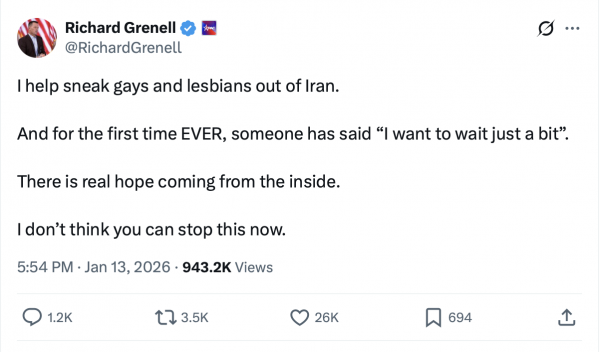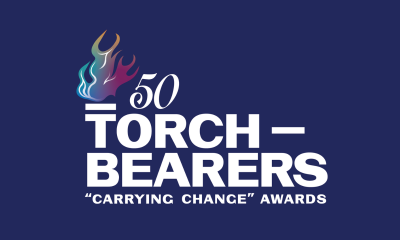World
These eight autistic LGBTQ people are making a difference
June 18 is Autistic Pride Day

June 18 is Autistic Pride Day — a day for us, autistic people, to celebrate our existence despite a world that often tries to erase or change us. Most of us don’t see autism as a disorder to fight; it’s part of who we are — autism determines how we think, communicate, and see the world. That’s why rhetoric like RFK Jr.’s “War on Autism” feels so deeply offensive.
But today, in the face of growing attacks on both autistic and LGBTQI+ rights, it’s important to focus on something hopeful. There’s a strong overlap between the autistic and LGBTQI+ communities — and since Autistic Pride Day falls in the middle of Pride month, I want to celebrate that connection.
Here are eight incredible autistic LGBTQI+ people who have helped change how the world sees both communities, and who can inspire the next generation.
Jim Sinclair (activist)
Jim Sinclair is a founder of the modern neurodiversity movement; a movement based on the idea that the diversity of how the human brain works is a natural part of human variation, like skin color or sexual orientation. Jim Sinclair is a co-founder of the first autistic organization created by autistic people for autistic people: Autistic Network International. His essay “Don’t Mourn For Us” helped millions of parents worldwide to accept their autistic kids. Jim is also an asexual and intersex activist who was raised as a girl. Jim hadn’t spoken orally before the age of 12 but felt from early on that he was not a girl. He was almost institutionalized in a psychiatric facility for refusing to accept a female gender identity and role but was instead subjected to “conversion therapy.”
As an adult, Jim speaks for intersex rights in front of the Intersex Society of North America and refuses to accept the gender binary for himself.
Bella Ramsey (actress)
Bella is a world-famous British actress, best known for their roles as Lyanna Mormont in “Game of Thrones” and Ellie in “The Last of Us” TV series. They are also an openly nonbinary autistic person, and one of the most visible autistic queer people in the world.
Despite the hate Bella receives because of their political views and non-conventional appearance, they continue to openly support trans rights and refuse to accept the femininity assigned at birth.
Andrew Joseph White (writer)
Andrew is an American young adult author whose books “Hell Followed With Us,” “The Spirit Bares Its Teeth,” and “Compound Fracture” became bestsellers and received numerous awards. Born and raised in West Virginia, Andrew is openly bi, autistic, and trans. He writes stories about autistic trans kids — stories he needed when he was younger — often with speculative horror elements that deal with transphobia, ableism, family alienation, and religious bigotry.
Andrew’s first adult horror novel, “You Weren’t Meant To Be Human” about an autistic trans man, will be published in September 2025 and is inspired by trans people’s struggle for abortion rights.
Matt Cain (writer, broadcaster)
Matthew Cain is an openly gay British writer and broadcaster, mostly famous for his novels “The Madonna of Bolton,” “The Secret Life of Albert Entwistle,” “Becoming Ted,” and “One Love.” He was also Channel 4’s first culture editor and editor-in-chief of Attitude magazine and has judged the Costa Prize. In 2025, Matt was awarded a Member of the Order of the British Empire for his services to LGBTQI+ culture — a well-deserved recognition for someone who’s helped bring queer stories into the light.
In 2025, Matt announced that he had been diagnosed with autism, which was “eye-opening” for him and helped him to rethink his past. It also provided a new role model for autistic gay people around the globe.
Lý Xīnzhèn Zhāngsūn (activist, attorney)
Lý Xīnzhèn Zhāngsūn, formally and mostly known as Lydia X. Z. Brown, is a queer, nonbinary, East Asian American advocate, attorney, writer, educator, and community organizer whose work centers on disability justice — particularly for autistic and multiply marginalized people. Over the past 15 years, they’ve trained hundreds across academia, nonprofits, companies, and government on issues at the intersection of disability, race, gender, queerness, and migration. They are one of the most outspoken advocates for disabled people of color in the world, and their work has inspired autistic activists worldwide.
They co-founded the Autistic People of Color Fund and co-edited “All the Weight of Our Dreams: On Living Racialized Autism.” As an educator, they teach in the Disability Studies Program and the Women’s and Gender Studies Program at Georgetown University, as well as in the American Studies Program at American University’s Department of Critical Race, Gender, and Culture Studies.
Jarry (social media influencer)
Jarry is an autistic transgender activist and social media influencer from Russia, who created the first Russian-language YouTube channel about the specific presentation of autism among the majority of women, girls, and other individuals assigned female at birth — a topic still unknown not just to general public, but to many psychiatrists and experts in the post-Soviet region. Because of the Soviet colonial legacy, Russian remains a dominant language in Eastern Europe, so Jarry has influence beyond Russia.
Jarry also led online support groups for autistic folks — an important step in a region where there are no such groups in most of the cities. After Russia launched its full-scale war against Ukraine in 2022, Jarry became an outspoken supporter of Ukraine, and had to ask for political asylum in Europe.
Hannah Gadsby (comedian)
Hannah is an Australian comedian, actor, and writer who won the final of the Raw Comedy competition for new comedians in 2006. In 2018, their show “Nanette” on Netflix won the Primetime Emmy Award for Outstanding Writing for a Variety Special and a Peabody Award.
Hannah was assigned female at birth but identifies as genderqueer. Their wife is also their producer, and their queerness is an integral part of their professional life.
They found out they are autistic later in life, which helped them better understand their experiences. Hannah also made millions of people rethink the stereotype that autistic people don’t understand humor.
Akwaeke Emezi (writer)
Akwaeke Emezi is a Nigerian author, best known for their critically acclaimed novels “Freshwater,” “Pet,” and the New York Times bestselling “The Death of Vivek Oji.” In their novels, Akwaeke explores topics such as immigration and displacement, trauma (queerness, Blackness, and alienation. For example, while writing “Pet,” Akwaeke focused on creating the book they needed while growing up as a trans Black disabled person.
Born in Umuahia, Nigeria, like many Nigerian people, Akwaeke faced a lot of stigma in the West. They have struggled with mental health like many non-white, neurodivergent queer people living at the intersection of multiple identities.
They are a powerful role model for non-white autistic people seeking recognition and acceptance despite widespread stigma.
There are many more amazing autistic LGBTQI+ people around the world who are changing both communities every day. This list is extremely subjective and based on my own experience with autistic community in different countries and the way I saw the influence of specific people worldwide. Despite that in making this list, I tried to include as many different autistic people from various backgrounds as possible, unfortunately, many incredible autistic LGBTQI+ folks remain unseen due to regional and linguistic barriers that prevent their stories from reaching a wider audience.
Colombia
Gay Venezuelan opposition leader: Country’s future uncertain after Maduro ouster
Yendri Rodríguez fled to Colombia in 2024 after authorities ‘arbitrarily detained’ him

A gay Venezuelan opposition leader who currently lives in Colombia says his country’s future is uncertain in the wake of now former President Nicolás Maduro’s ouster.
The Washington Blade spoke with Yendri Rodríguez on Thursday, 12 days after American forces seized Maduro and his wife, Cilia Flores, at their home in Caracas, the Venezuelan capital, during an overnight operation.
Maduro and Flores on Jan. 5 pleaded not guilty to federal drug charges in New York. The Venezuelan National Assembly the day before swore in Delcy Rodríguez, who was Maduro’s vice president, as the country’s acting president.
Rodríguez, who lives in the Colombian capital of Bogotá, described the events surrounding Maduro’s ouster as “very confusing.”
“It was a very surprising thing that left me in shock,” Rodríguez told the Blade. “We also thought, at least from the perspective of human rights, that the United States was going to respect international law and not go to the extreme of bombing and extracting Maduro.”
“Other questions also arise,” he added. “What could have been done? What else could have been done to avoid reaching this point? That is the biggest question posed to the international community, to other countries, to the human rights mechanisms we established before Trump violated international law, precisely to preserve these mechanisms and protect the human rights of Venezuelan people and those of us who have been forced to flee.”
Rodríguez three years ago founded the Venezuelan Observatory of LGBTIQ+ Violence. He also worked with Tamara Adrián, a lawyer who in 2015 became the first openly transgender woman elected to the Venezuelan National Assembly, for more than a decade.
Members of Venezuela’s military counterintelligence agency, known by the Spanish acronym DGCIM, on Aug. 3, 2024, “arbitrarily detained” Rodríguez as he was trying to leave the country to attend a U.N. human rights event in Geneva.
Rodríguez told the Blade he was “forcibly disappeared” for nearly nine hours and suffered “psychological torture.” He fled to Colombia upon his release.
Two men on Oct. 14, 2025, shot Rodríguez and Luis Peche Arteaga, a Venezuelan political consultant, as they left a Bogotá building.
The assailants shot Rodríguez eight times, leaving him with a fractured arm and hip. Rodríguez told the Blade he has undergone multiple surgeries and has had to learn how to walk again.
“This recovery has been quite fast, better than we expected, but I still need to finish the healing process for a fractured arm and complete the physical therapy for the hip replacement I had to undergo as a result of these gunshots,” he said.

María Corina Machado, who won the 2025 Nobel Peace Prize, and other Venezuelan opposition leaders said Maduro’s government targeted Rodríguez and Peche. Colombian President Gustavo Petro and his government also condemned the attack.
Colombian authorities have yet to arrest anyone in connection with the attack.
Rodríguez noted to the Blade he couldn’t sleep on Jan. 3 because “of the aches and pains” from the shooting. He said a friend who is “helping me out and looking after my things” was the one who told him about the operation the U.S. carried out to seize Maduro and Flores.
“He said, ‘Look at this! They’re bombing Caracas! And I was like, ‘What is this?'” recalled Rodríguez.
White House ‘not necessarily’ promoting human rights agenda
Rodríguez noted Delcy Rodríguez “is and forms part of the mechanisms of repression” that includes DGCIM and other “repressive state forces that have not only repressed, but also tortured, imprisoned, and disappeared people simply for defending the right to vote in (the) 2024 (election), simply for protesting, simply for accompanying family members.” Yendri Rodríguez told the Blade that “there isn’t much hope that things will change” in Venezuela with Delcy Rodríguez as president.
“Let’s hope that countries and the international community can establish the necessary dialogues, with the necessary intervention and pressure, diplomatically, with this interim government,” said Yendri Rodríguez, who noted hundreds of political prisoners remain in custody.
He told the Blade the Trump-Vance administration does not “not necessarily” have “an agenda committed to human rights. And we’ve seen this in their actions domestically, but also in their dealings with other countries.”
“Our hope is that the rest of the international community, more than the U.S. government, will take action,” said Yendri Rodríguez. “This is a crucial moment to preserve democratic institutions worldwide, to preserve human rights.”
Yendri Rodríguez specifically urged the European Union, Colombia, Brazil, and other Latin American countries “to stop turning a blind eye to what is happening and to establish bridges and channels of communication that guarantee a human rights agenda” and to try “to curb the military advances that the United States may still be considering.”

Yendri Rodríguez told the Blade he also plans to return to Venezuela when it is safe for him to do so.
“My plan will always be to return to Venezuela, at least when it’s no longer a risk,” he said. “The conditions aren’t right for me to return because this interim government is a continuation of Maduro’s government.”
Editor’s note: International News Editor Michael K. Lavers was on assignment in Bogotá, Colombia, from Jan. 5-10.
Iran
Grenell: ‘Real hope’ for gay rights in Iran as result of nationwide protests
Former ambassador to Germany claimed he has sneaked ‘gays and lesbians out of’ country

Richard Grenell, the presidential envoy for special missions of the United States, said on X on Tuesday that he has helped “sneak gays and lesbians out of Iran” and is seeing a change in attitudes in the country.
The post, which now has more than 25,000 likes since its uploading, claims that attitudes toward gays and lesbians are shifting amid massive economic protests across the country.
“For the first time EVER, someone has said ‘I want to wait just a bit,” the former U.S. ambassador to Germany wrote. “There is real hope coming from the inside. I don’t think you can stop this now.”

Grenell has been a longtime supporter of the president.
“Richard Grenell is a fabulous person, A STAR,” Trump posted on Truth Social days before his official appointment to the ambassador role. “He will be someplace, high up! DJT”
Iran, which is experiencing demonstrations across all 31 provinces of the country — including in Tehran, the capital — started as a result of a financial crisis causing the collapse of its national currency. Time magazine credits this uprising after the U.N. re-imposed sanctions in September over the country’s pursuit of nuclear weapons.
As basic necessities like bread, rice, meat, and medical supplies become increasingly unaffordable to the majority of the more than 90 million people living there, citizens took to the streets to push back against Iran’s theocratic regime.
Grenell, who was made president and executive director of the John F. Kennedy Center for the Performing Arts last year by Trump, believes that people in the majority Shiite Muslim country are also beginning to protest human rights abuses.
Iran is among only a handful of countries in which consensual same-sex sexual relations remain punishable by death, according to the Death Penalty Information Center.
Venezuela
AHF client in Venezuela welcomes Maduro’s ouster
‘This is truly something we’ve been waiting for’ for decades

An AIDS Healthcare Foundation client who lives in Venezuela told the Washington Blade he welcomes the ouster of his country’s former president.
The client, who asked the Blade to remain anonymous, on Thursday said he felt “joy” when he heard the news that American forces seized Nicolás Maduro and his wife, Cilia Flores, at their home in Caracas, the Venezuelan capital, during an overnight operation on Jan. 3.
“This is truly something we’ve been waiting for for 26 or 27 years,” the AHF client told the Blade.
Hugo Chávez became Venezuela’s president in 1999. Maduro succeeded him in 2013 after he died.
“I’ve always been in opposition,” said the AHF client, who stressed he was speaking to the Blade in his personal capacity and not as an AHF representative. “I’ve never agreed with the government. When I heard the news, well, you can imagine.”
He added he has “high hopes that this country will truly change, which is what it needed.”
“This means getting rid of this regime, so that American and foreign companies can invest here and Venezuela can become what it used to be, the Venezuela of the past,” he said.
The AHF client lives near the Colombia-Venezuela border. He is among the hundreds of Venezuelans who receive care at AHF’s clinic in Cúcuta, a Colombian city near the Táchira River that marks the border between the two countries.
The Simón Bolívar Bridge on the Colombia-Venezuela border on May 14, 2019. (Washington Blade video by Michael K. Lavers)
The AHF client praised U.S. President Donald Trump and reiterated his support for the Jan. 3 operation.
“It was the only way that they could go,” he said.
The Venezuelan National Assembly on Jan. 4 swore in Delcy Rodríguez, who was Maduro’s vice president, as the country’s acting president. The AHF client with whom the Blade spoke said he is “very optimistic” about Venezuela’s future, even though the regime remains in power.
“With Maduro leaving, the regime has a certain air about it,” he said. “I think this will be a huge improvement for everyone.”
“We’re watching,” he added. “The actions that the United States government is going to implement regarding Venezuela give us hope that things will change.”
-

 U.S. Supreme Court4 days ago
U.S. Supreme Court4 days agoSupreme Court hears arguments in two critical cases on trans sports bans
-

 Virginia5 days ago
Virginia5 days agoWoman arrested for anti-gay assault at Alexandria supermarket
-

 Commentary5 days ago
Commentary5 days agoHonoring 50 queer, trans women with inaugural ‘Carrying Change’ awards
-

 District of Columbia4 days ago
District of Columbia4 days agoRuby Corado sentenced to 33 months in prison




















